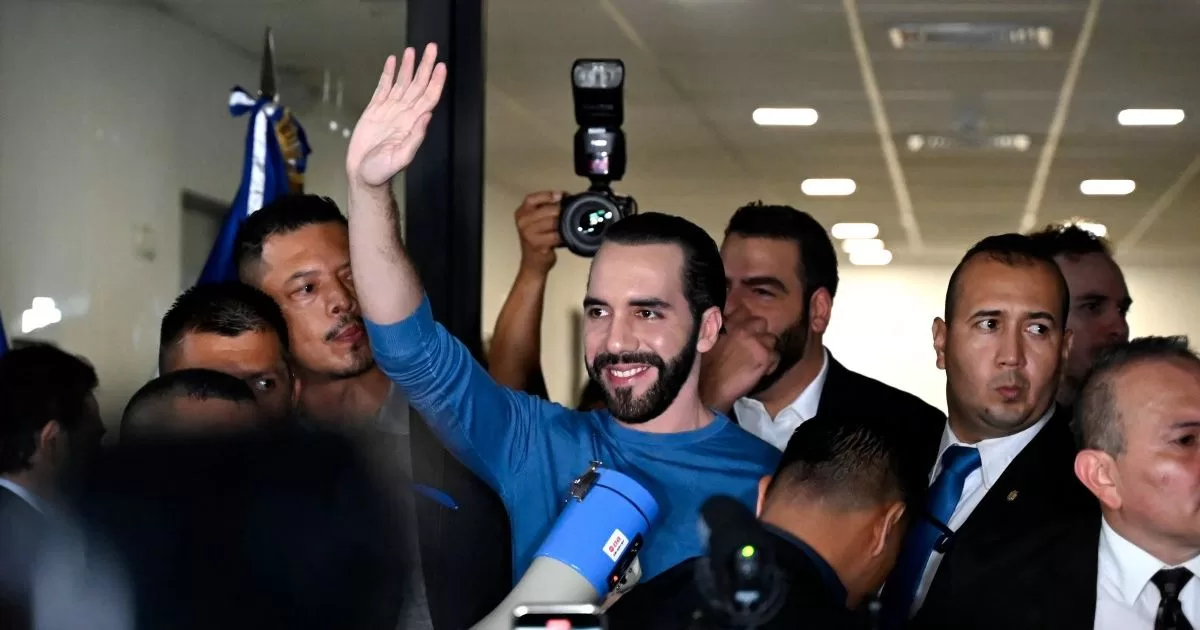In this electoral process, which is presented as “historic” and in which they are 6.2 million voters called to votethe Legislature will be renewed with 60 deputies and Bukele is emerging as the first ruler to be re-elected since 1992.
Re-election will be probable, thanks to a resolution of the Constitutional Chamber of the Supreme Court“accepted and endorsed” by the Supreme Electoral Court, the Congress – with a pro-government majority – and the opposition that, despite criticism, has decided to accept the “rules of the game” and legitimize the elections with its participation.
Nothing and no one questions Bukele’s second presidential term, enjoying a voting intention of 81.9%, according to a recent survey carried out by the Central American University (UCA).
“Day by day, the president’s main adversary may be himself. “He is competing against his own first government, with his own antecedents, and that is what will mark the nature of this election,” he told DIARIO LAS AMERICAS the journalist and specialist in Strategic Communication, Gabriel Trillos.
Given this “quite favorable outlook” for Bukele, Trillos considers that the main question that arises is how many “voters he manages to mobilize” and what will be the “margin by which he will achieve victory.”
Worn opposition
Los opposition candidates do not reach 10% of the voting intentionaccording to the UCA survey, which, in the opinion of the sociologist and political analyst Rene Martinezmakes in “in practice there is only one candidate”.
“In recent surveys people have been asked if they know the opposition candidates, and they are practically unknown. There has been no type of propaganda on their part and they have not even presented a five-year government plan. “We are seeing a presidential election campaign where the only thing that appears is one candidate (Bukele),” says Martínez.
The presidential candidates who are closest to the president are the former deputy Manuel Flores, by the Farabundo Martí National Liberation Front (FMLN) -left-, with 4.2% support; and the businessman Joel Sanchez, from the Nationalist Republican Alliance (ARENA) -right-, with 3.4%. The three remaining opponents appear in the polls with less than 2.5% of citizen support.
“It is good that there is always opposition, it is important for any democracy. There are five candidates who are competing, also the two main parties that governed the country ARENA and the FMLN have candidates, but They have quite a lot of wear“, explains to DIARIO LAS AMERICAS the vice president of the Salvadoran Congress, Guillermo Gallegos.
This “wear and tear” of the traditional parties, which governed after the Chapultepec Peace Accords signed in 1992 until 2019, Martínez and Trillos also recognize it.
“We are seeing a different political logic, in which leadership has more weight than the parties themselves. We practically see the disappearance of traditional partieswhose leaders made public management a patrimonial State, occupying positions without having sufficient merit to do so,” Martínez asserts.
In Trillos’ opinion, the opposition organizations are “fighting” to achieve the minimum of 3% of the votes that the electoral law requires to survive as a political party, is a product of “wear and tear” and social rejection.
“Depending on the numbers, we can finish consolidating this rejection of the traditional partywhich has been expressed in the 2019 and 2021 elections. It will be possible to see if it materializes or if it is given the opportunity to survive as a representative of minorities,” he points out.
Fight against gangs
In El Salvador there is also no doubt as to what has given him the level of approval that President Bukele accumulates: his fight against “the cancer of gangs”which for years kept the Salvadoran population subdued.
“We were known as the capital of death. Previous governments did not solve the problem of crime and they almost convinced us that it could not be solved, but with the arrival of Bukele and the implementation of his Territorial Control Plan, it is almost completely resolved,” he highlights.
The environment of security and tranquility, which returned to Salvadorans a territory that was in the hands of criminal organizations and a normal lifestyle, gives the president the advantage.
“The main issue that they value and appreciate for re-electing him is having achieved security and having, practically, put an end to the cancer that was the gangs. That is what motivates Salvadorans to vote for the president, having peace and tranquility”says the official deputy, Guillermo Gallegos.
Under a state of emergency regime, extended for the twenty-second time in early January and strongly questioned by opponents and human rights defenders, Bukele achieved a considerable reduction in the homicide rate, which closed 2023 at 2.4 per 100,000 inhabitantsaccording to official figures.
For Trillos, the fact that around 91% of citizens say they feel safe in their neighborhoods demonstrates the perception of security they have. “When they talk about human rights, they remember their human rights., which were violated for many years by gangs. Now the perception and reality about security has shaped a new country image,” he says.
Although he recognizes that arrests could have occurred “due to a bad procedure,” Gallegos considers that the criticism is part of an opposition “strategy” to “discredit” the work carried out in terms of security.
“There have not been systematic human rights violations, but rather they have been isolated events, where people who perhaps had nothing to do with the gangs have been captured, but they have been resolved by releasing them,” he points out.
Straight
For analysts, maintaining security, improving the economy and consolidating social development, through education, health and coexistence, would be the challenges that Bukele would have to face in a new administration, to avoid the resurgence of gangs.
In this sense, relations with the United States play a fundamental role, being a “strategic partner” and “second home” of more than three million Salvadorans. “We are rebuilding our country, both from the Assembly and from the Presidency. Improve the economy, generate employment, strengthen health and educationare the main issues on which the president will focus his next term,” Gallegos emphasizes.
@ebritop22


